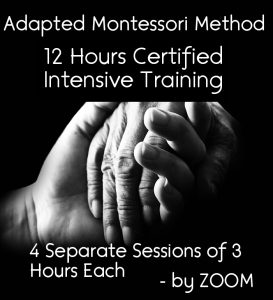
The Importance of Cognitive Disorders Training –
Cognitive disorders, encompassing conditions like dementia and Alzheimer’s disease, have become increasingly prevalent as our population ages. These disorders can have a profound impact on individuals and their families, affecting memory, thinking, and behavior. However, the profound impact can be lessened when we understand the importance of cognitive disorders training.
In response to this growing challenge, cognitive disorders training – such as the 12 Hour Certified Intensive program offered by the Montessori Alzheimer Center for groups and individuals – has emerged as a vital tool in providing effective care and support for those affected.
Cognitive disorders training equips healthcare professionals, caregivers, and even family members with the knowledge, skills, and strategies necessary to navigate the complexities of these conditions. The training covers a wide range of topics, from understanding the physiological underpinnings of cognitive decline to developing empathetic communication techniques. This comprehensive approach aims to improve the quality of life for individuals living with cognitive disorders and enhance the overall caregiving experience.
Communication lies at the heart of effective caregiving for cognitive disorders. Training emphasizes the importance of clear, patient-centered communication. Some of the techniques taught to enhance interactions help participants to acknowledge and respect the emotions and experiences of individuals with cognitive disorders.

Caregivers learn to adapt their communication styles to the individual’s cognitive abilities, fostering a sense of connection and reducing frustration.
Cognitive disorders training also delves into creating dementia-friendly environments. By modifying physical spaces and routines, caregivers can minimize confusion and agitation in those with cognitive disorders. Techniques like memory aids, sensory stimulation, and structured activities are explored to foster engagement and a sense of purpose.
In addition to professional caregivers, cognitive disorders training benefits family members who often play a pivotal role in the care network. These programs offer insights into coping with the emotional toll of caregiving, addressing the challenges of behavioral changes, and maintaining self-care. Families are empowered to make informed decisions while providing a supportive and loving environment.
As research advances, cognitive disorders training evolves to incorporate the latest findings and evidence-based practices. This ensures that caregivers are equipped with up-to-date information on medical treatments, non-pharmacological interventions, and emerging therapies.
By staying current, caregivers can offer the best possible care and support to individuals living with cognitive disorders.
Cognitive disorders training serves as a cornerstone in addressing the unique needs of individuals with conditions like dementia and Alzheimer’s disease. By imparting knowledge, fostering empathetic communication, and promoting a holistic approach to care, these training programs empower caregivers and healthcare professionals to make a meaningful difference in the lives of those affected.
promoting a holistic approach to care, these training programs empower caregivers and healthcare professionals to make a meaningful difference in the lives of those affected.
As we navigate the challenges posed by cognitive disorders, a commitment to ongoing training remains essential in enhancing the well-being and dignity of those living with these conditions.
The Montessori Alzheimer Center offers two popular, affordable conferences dealing with cognitive disorders. Click for details:
Overcoming Communication Difficulties and Disruptive Behaviors
Activities Adapted for the Cognitively Impaired
Read more about our 12 Hour Certified Intensive training:
The Montessori Method Adapted for the Cognitively Impaired
Like us on Facebook!




